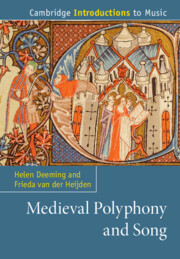Book contents
- Cambridge Introductions to Music
- Medieval Polyphony and Song
- Copyright page
- Dedication
- Contents
- Figures
- Tables
- Boxes
- Music Examples
- Acknowledgements
- Chapter 1 Introduction and Historical Outline
- Chapter 2 Monastic Centres in the Early Middle Ages
- Chapter 3 Court and Cloister in Aquitaine and Occitania
- Chapter 4 Paris: City, Cathedral, and University
- Chapter 5 Courts and Cities in Northern France
- Chapter 6 Scribes, Scholars, and Secretaries in Fourteenth-Century France
- Chapter 7 England after the Norman Conquest
- Chapter 8 On the Shores of the Mediterranean: Italy, Sicily, and the Iberian Peninsula
- Chapter 9 The German- and Dutch-Speaking Lands
- Chapter 10 Medievalisms: Modern Encounters with Medieval Polyphony and Song
- Glossary
- Bibliography
- Discography
- Index
- Cambridge Introductions to Music
- References
Chapter 3 - Court and Cloister in Aquitaine and Occitania
Published online by Cambridge University Press: 27 April 2023
- Cambridge Introductions to Music
- Medieval Polyphony and Song
- Copyright page
- Dedication
- Contents
- Figures
- Tables
- Boxes
- Music Examples
- Acknowledgements
- Chapter 1 Introduction and Historical Outline
- Chapter 2 Monastic Centres in the Early Middle Ages
- Chapter 3 Court and Cloister in Aquitaine and Occitania
- Chapter 4 Paris: City, Cathedral, and University
- Chapter 5 Courts and Cities in Northern France
- Chapter 6 Scribes, Scholars, and Secretaries in Fourteenth-Century France
- Chapter 7 England after the Norman Conquest
- Chapter 8 On the Shores of the Mediterranean: Italy, Sicily, and the Iberian Peninsula
- Chapter 9 The German- and Dutch-Speaking Lands
- Chapter 10 Medievalisms: Modern Encounters with Medieval Polyphony and Song
- Glossary
- Bibliography
- Discography
- Index
- Cambridge Introductions to Music
- References
Summary
The music in this chapter comes from a large area of what is now Southwest France, in which Occitan (or the langue d‘oc) was the principal vernacular language. From the network of courts and their noble rulers came the culture of the troubadours, poet-composers whose love songs in Occitan constitute the first large body of medieval vernacular literature to be written down. We explore the lives of a range of troubadours, considering the various positions they occupied in courtly society, and examine how the conventions and practicalities of courtly life informed the literary theme of ‘courtly love’ that they cultivated. The contemporary tradition of Latin song and polyphony from monasteries in the same area is then discussed. We look at the changes in Latin poetry that have been described as nova cantica (‘new song’), and the polyphonic techniques of Aquitanian composers. Lastly, the connections between these two traditions are charted, and a range of shared contexts, themes, and approaches are brought to light.
Keywords
- Type
- Chapter
- Information
- Medieval Polyphony and Song , pp. 33 - 55Publisher: Cambridge University PressPrint publication year: 2023

